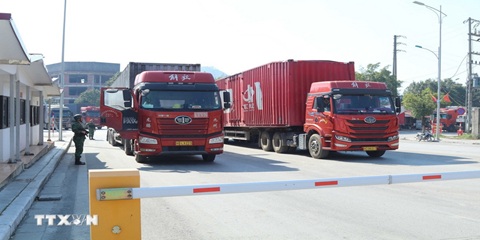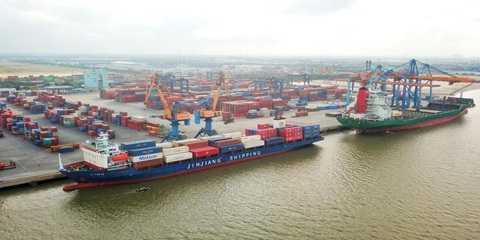Want to be in the loop?
subscribe to
our notification
Business News
EFFECTIVE IMPLEMENTATION OF PRIORITY PUBLIC INVESTMENTS: KEY TO SUPPORT GROWTH
The global landscape for 2022 was volatile and uncertain, weighed down by slowing growth and falling demand, persistent inflationary pressures and more aggressive monetary tightening, as well as heightened geopolitical tensions. This continues to be a double risk to global macroeconomic performance in 2023, as well as to Vietnam as a highly open economy.
This statement was delivered by Madam Carolyn Turk, World Bank Country Director for Vietnam, at an event to release the WB's latest Taking Stock report in Hanoi.
Growth expected at 6.3% in 2023
Vietnam’s economic growth is projected to ease to 6.3% in 2023 from a robust 8.2% last year, as services growth moderates and higher prices and interest rates weigh on households and investors, according to the World Bank's report. Growth is expected to pick up to 6.5% in 2024 as the economies of Vietnam’s main export markets gain strength.
The outlook for Vietnam reflects heightened uncertainty in the global economy. Downside risks include weaker-than-expected growth in Vietnam’s major export markets, which include the United States, China and the Eurozone, tightening financial conditions, higher domestic inflation, weaknesses in the balance sheets of corporate, banking and household sectors, and financial sector vulnerabilities.
Domestic and external headwinds warrant increased vigilance and data-driven policy responses. These include managing the trade-off between growth and inflation and strengthening the supervisory framework for the financial sector. On the upside, stronger than expected recovery of global growth could lift exports and hence growth above the baseline projection is grounded.
Vietnam has the fiscal space to implement measures to boost growth
Ms. Carolyn Turk said, Vietnam's economy can achieve an even better outcome if the fiscal implementation, especially public investment, is made more effective. The role of supportive fiscal policy and effective enforcement will continue to be crucial to Vietnam's economic recovery and growth, especially amid global headwinds. Vietnam's monetary and financial markets were volatile in 2022 while authorities took swift action to restore market confidence, many systemic weaknesses in the financial and banking market were revealed - and they may likely affect Vietnam's macroeconomic stability. Addressing these weaknesses through drastic and consistent reforms will ensure not only stability but also long-term economic performance and growth.
“Vietnam has the fiscal space to implement measures to boost growth, unlike many other countries. Effective implementation of priority public investments is key to support growth, both in the short-term and in the longer-term. Also, fiscal and monetary policies must be synchronized to ensure that support to the economy and macroeconomic stability are achieved effectively,” said Ms. Carolyn Turk
For Vietnam to achieve its objective of becoming a high-income economy by 2045, the country should more effectively leverage its diversified services sector to secure more sustained productivity growth. This would entail undertaking reforms to enhance services sector productivity and its cross-sectoral contributions to the productivity growth of manufacturing and agricultural sectors. Vietnam’s services sector has grown as a share of the economy, employed a greater share of workers, and seen its labor productivity increasing in the decade since 2019. However, Vietnam's performance in this area lags behind peer countries such as Malaysia, the Philippines, and Indonesia. Exports of knowledge-rich services known as “global innovator services” constitute only 9% of total services exports, and only 6.4% of total employment in the services sector is in this sub-sector, which includes information and communications technology, finance, and professional services, which are among the most productive services areas in the economy. The small scale of firms, restrictions to services trade, low technology adoption, and scarcity of inter-sectoral linkages affect productivity, suggesting that there is room for improvement through appropriate policy actions.
To accelerate growth of this sector, Vietnam could consider reducing restrictions to services trade and foreign investment in this area and implementing reforms to enhance competition and access to finance for domestic firms; encouraging firm-level product and process innovation and technology adoption; strengthening skills and capabilities of workers and managers; focusing on services that can promote further growth of other sectors, particularly processing and manufacturing.
Source: VCCI
Related News

VIETNAM’S SEAFOOD EXPORTS HIT OVER US$10 BILLION IN JAN-NOV
Seafood export revenue in November alone amounted to nearly US$990 million, up 6.6% year-on-year. Key product groups posted solid gains. Shrimp exports rose 11.7% to over US$385 million, supported by strong demand for whiteleg shrimp and lobster. Tra fish shipments increased 9.7% to almost US$197 million, while marine fish, squid, and mollusk exports maintained their recovery.

VIETNAM’S AGRO-FORESTRY-FISHERY EXPORTS HIT NEW RECORD IN JAN-NOV
Vietnam’s agro-forestry-fishery export revenue reached an estimated US$64.01 billion in the first 11 months of 2025, up 12.6% year-on-year and surpassing the full-year record of US$62.4 billion set in 2024. Agricultural exports reached US$34.24 billion, up 15% year-on-year, while livestock products brought in US$567.4 million, a 16.8% increase. Seafood exports rose 13.2% to US$10.38 billion, and forestry products earned US$16.61 billion, up 5.9%.

HANOI REPORTS RECORD-HIGH BUDGET REVENUE IN 2025
Hanoi’s budget revenue is estimated to reach VND641.7 trillion in 2025, the highest level ever recorded and nearly 25% above the revised target, according to a report by the municipal government. Data from the city’s socioeconomic performance review shows that total state budget collections in 2025 are projected to reach 124.9% of the adjusted plan and rise 24.9% from 2024, the Vietnam News Agency reported.

VIETNAM, CHINA TO PILOT TWO-WAY CARGO TRANSPORT AT LANG SON BORDER
Vietnam and China will launch a one-year pilot program on December 10 to allow two-way cargo transport through the Huu Nghi–Youyi Guan international border gates in Lang Son Province, reported the Vietnam News Agency. The Dong Dang-Lang Son Economic Zone Management Board said the trial aims to reduce transport costs and improve customs clearance capacity.

VIETNAM’S IMPORT-EXPORT VALUE NEARS US$840 BILLION IN JAN-NOV
The total value of Vietnam’s imports and exports was nearly US$840 billion between January and November this year, the highest level ever recorded, according to the National Statistics Office. In its latest report on the country’s socio-economic performance, the National Statistics Office highlighted a series of positive economic indicators, with trade emerging as one of the strongest drivers of growth.

OVER 19 MILLION INTERNATIONAL VISITORS COME TO VIETNAM IN JAN-NOV
Vietnam received more than 19.1 million international visitors in the first 11 months of 2025, a 20.9% increase year-on-year and the highest level ever recorded, according to the National Statistics Office. The figure surpasses the full-year record of 18 million arrivals set in 2019, before the Covid-19 pandemic. Nearly two million foreign visitors arrived in November alone, up 14.2% from October and 15.6% from the same period last year.
























